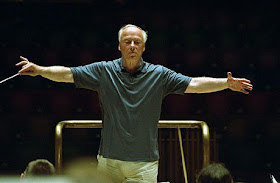This live recording pairs Richard Strauss' self-regarding tone poem Ein Heldenleben ("A Hero's Life") with Anton Webern's lush Im Sommerwind. It is a showcase for the 81-year old conductor Bernard Haitink, who draws beautiful sounds from the Chicago Symphony Orchestra. Haitink, who is finishing up a 4-year run as the CSO's Principal Conductor, has a particular touch for the late Romantics, with an affinity for Strauss' music. (His 1991 recording of Der Rosenkavalier is one of the finest in the catalogue.)
Ein Heldenleben is one of three autobiographical tone poems written by Strauss, that chronicle various aspects of his life in an odd form of "musical journalism" for large orchestra. (The other two are the Sinfonia domestica and the Alpine Symphony.) It is a popular Strauss work, but one that is regarded as "problematic" by music critics. That might be because the ever-blunt Strauss included a withering portrait of journalists in the second movement: "The Hero's Adversaries."
Mr. Haitink conducts Ein Heldenleben with passion and conviction. The opening is a stirring experience. The Love Scene is a mini-violin concerto within the work (really a portrait of the composer's wife, Pauline). Soloist Robert Chen plays with elegance, drawing out the long melodic lines that recall the best passages of Der Rosenkavalier and Die Frau Ohne Schatten Everything is perfectly balanced in The Hero's Battles, as surges of trumpets and horns clash with the string section in full flight. The winds take center stage for The Hero's Works of Peace, which quotes liberally from earlier Strauss works.
Im Sommerwind is the last gasp of tonality from Anton Webern before he embraced the discordant musical ideas of his teacher, Arnold Schoenberg. This 12-minute tone poem demands the full resources of both the orchestra and listener. Written in Webern's characteristic, compressed style, there is enough music here for an entire symphony. The work shifts between bird calls, percussive scrapes, and the buzzing of cicadas in the low winds. Lyric passages in the strings depict the rustle of leaves and grass, and the whole has a golden sheen of a hot day when the passing wind brings no cooling relief. It is a perfect pairing with Ein Heldenleben and rounds out this excellent document of Mr. Haitink and his Chicago forces in their element.

